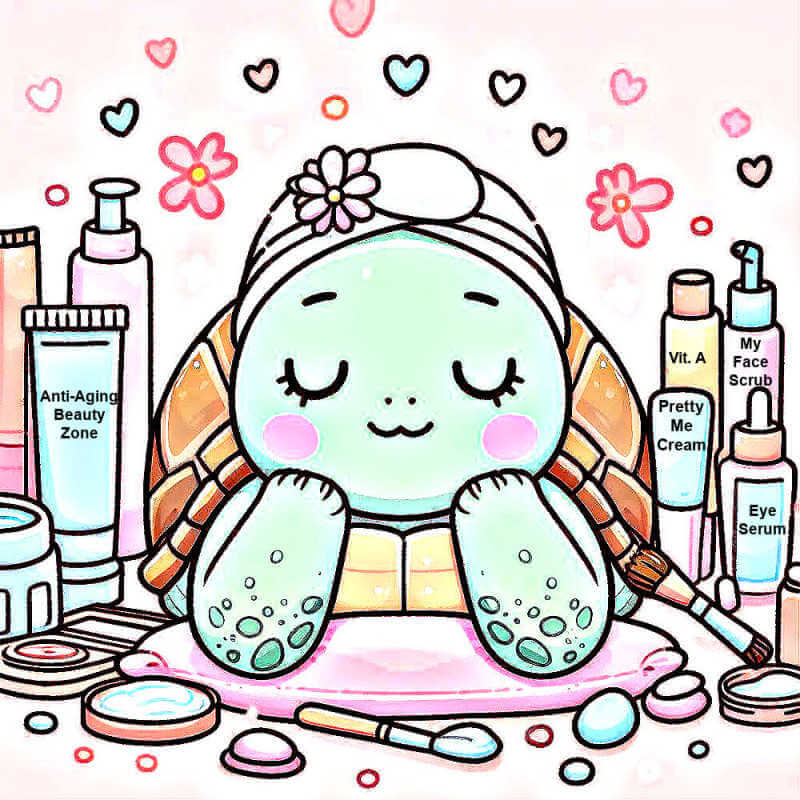- Home
- Homemade Skincare
- Turmeric Scrub
Turmeric Face Scrub Recipe: Easy DIY and How to Use
Turmeric face scrub recipe (easy & gentle)
Make this 3-ingredient turmeric face scrub in about 2 minutes. It’s a quick, gentle way to smooth texture and boost glow—plus stain-safe tips so you don’t tint your sink or towels.
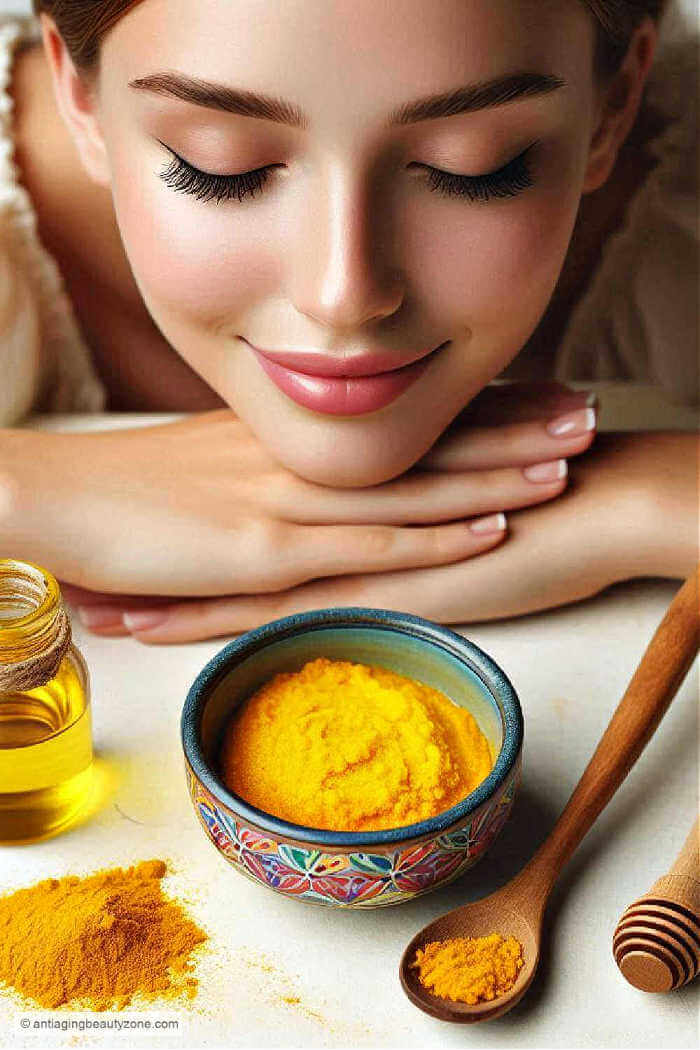
Turmeric scrub ingredients (what you’ll need)
- 1 tbsp turmeric powder (no additives)
- 2 tbsp fine brown sugar (gentler than white)
- 1–1.5 tbsp jojoba or any face oil
How to make turmeric face scrub
- Stir turmeric + sugar.
- Add oil until it looks like wet sand.
- Jar it; cap tightly.
How to use turmeric scrub (face)
- Massage on damp skin 30–60 sec with light pressure.
- Rinse; moisturize; SPF in AM.
- Start 1–2×/week.
Stain-safe tips:
- Tie hair back
- Dark washcloth
- Rinse sink/towels right away. “Wild turmeric / kasturi” stains less (still be careful).
New to exfoliation? Start here: gentle exfoliation over 40.
Turmeric face scrub benefits
Turmeric is rich in antioxidants and has soothing properties. Used in a mild scrub or mask, it can help skin feel smoother and look more radiant.
• Smoother feel and fresher-looking glow
• Loosens dull buildup so skincare absorbs better
• Looks more even over time (with SPF + consistency)
Storage & shelf life
Oil-only scrubs (with no water) you can keep about 2 weeks at room temp. Keep water out of the jar.
If smell or texture changes, remake a new batch.
Homemade turmeric face scrub recipes (by skin type)
If you have dry or damaged skin, hydration is key. Below are three powerful turmeric-based treatments designed to deeply moisturize and restore your complexion.
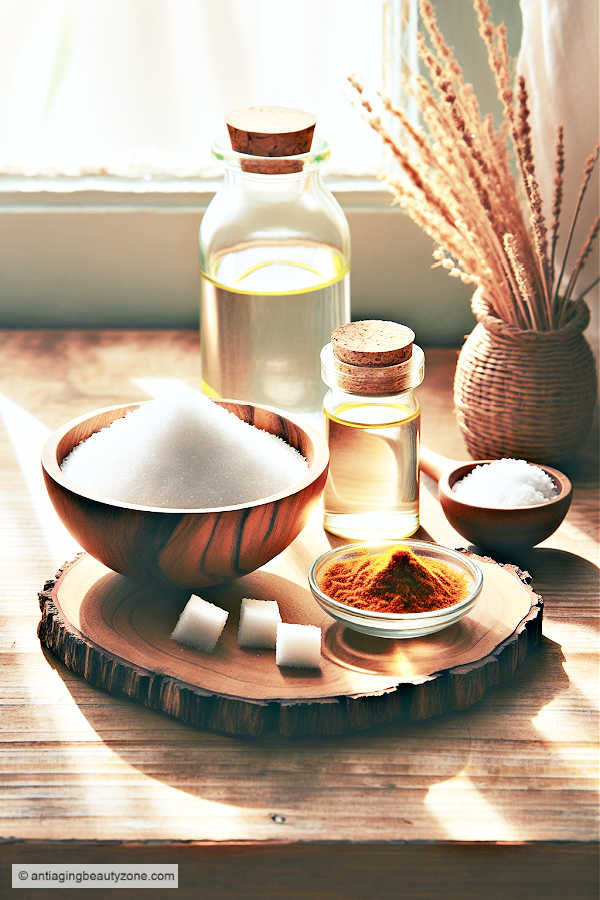
These simple scrubs come together quickly. And can be customized based on your complexion type.
1. Turmeric sugar scrub for face (dry/flaky)
- 1 tbsp turmeric
- 2 tbsp super-fine sugar
- 1–1.5 tbsp jojoba/almond oil
- Optional: ½ tsp oat flour for extra softness
Use: Mix dry → add oil; massage 30–60 sec; rinse.
Note: Finer sugar is gentler for 40+ skin. For more beginner-friendly tips, see sugar scrub for face.
*Note: What kind of turmeric should I use on my face? That depends. You can open a capsule or use it from your spice rack. But, make sure it's free of additives or preservatives, which can irritate the skin. Check this out before you try the recipe.
2. Deep comfort turmeric honey scrub (dry/wrinkled skin)
- 1 tbsp turmeric
- 2 tbsp fine brown sugar
- 1 tbsp honey •
- 1.5 tbsp avocado/olive oil
Use: Mix dry → add honey → add oil. Massage lightly; rinse lukewarm; moisturize.
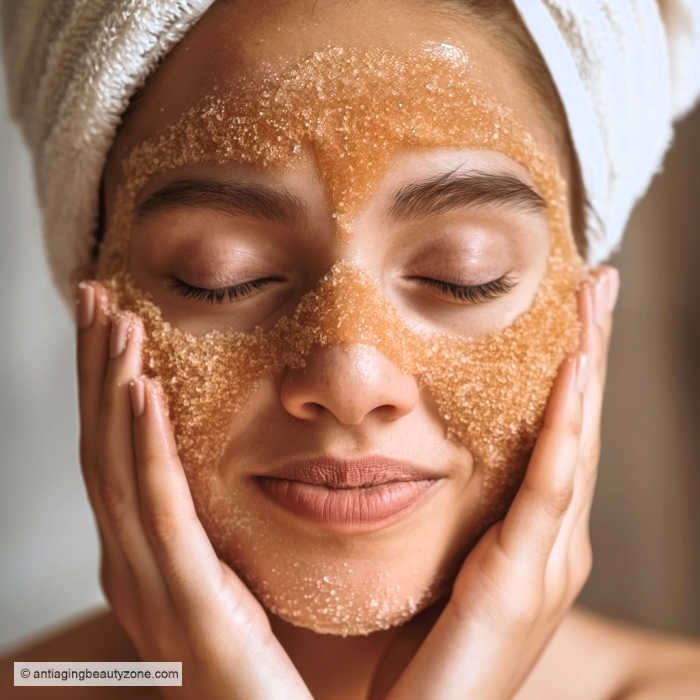
Note: For sensitive or dehydrated skin, this a mask can help provide deep hydration. Dryness can highlight fine lines, especially under the eyes. Be careful when applying masks to this delicate area. For tips on reducing these lines, see our tips on reducing criss-cross lines under the eyes.
3. Turmeric yogurt mask (sensitive/damaged)
- 1 tbsp turmeric
- 2 tbsp plain yogurt (or milk for thinner)
- 1 tbsp honey
Use: Apply 10–15 min; rinse. Choose this when skin needs soothing more than rubbing.
4. Turmeric polish for oily/acne-prone skin
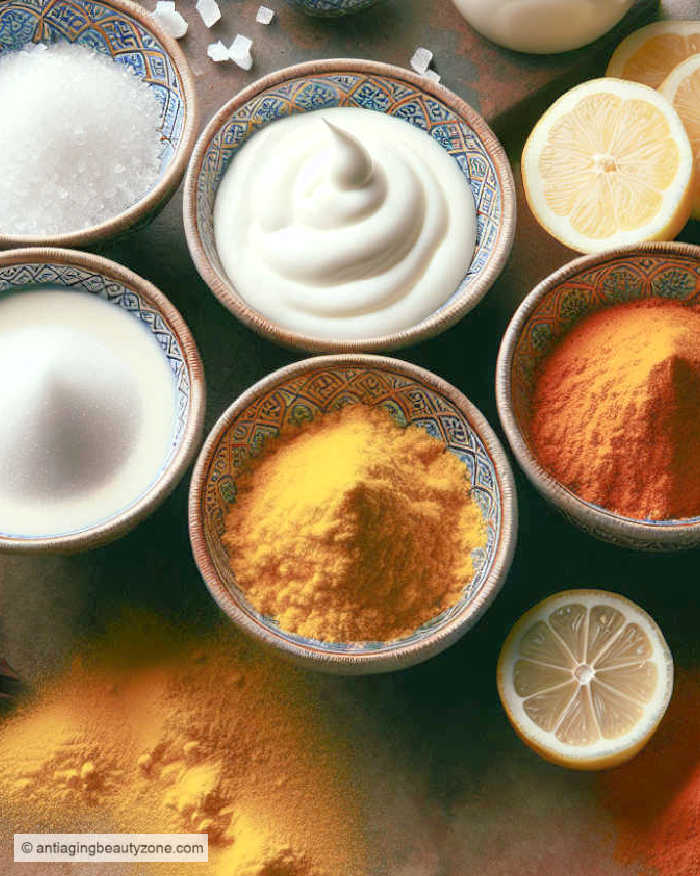
- 1 tbsp turmeric
- 1–2 tbsp yogurt
- ½ tsp rice flour
Use: Massage lightly on T-zone; rinse. If you use lemon: only a few drops, patch test, and use at night.
Prefer an enzyme-style polish? Try Korean face scrub at home.
My honest take
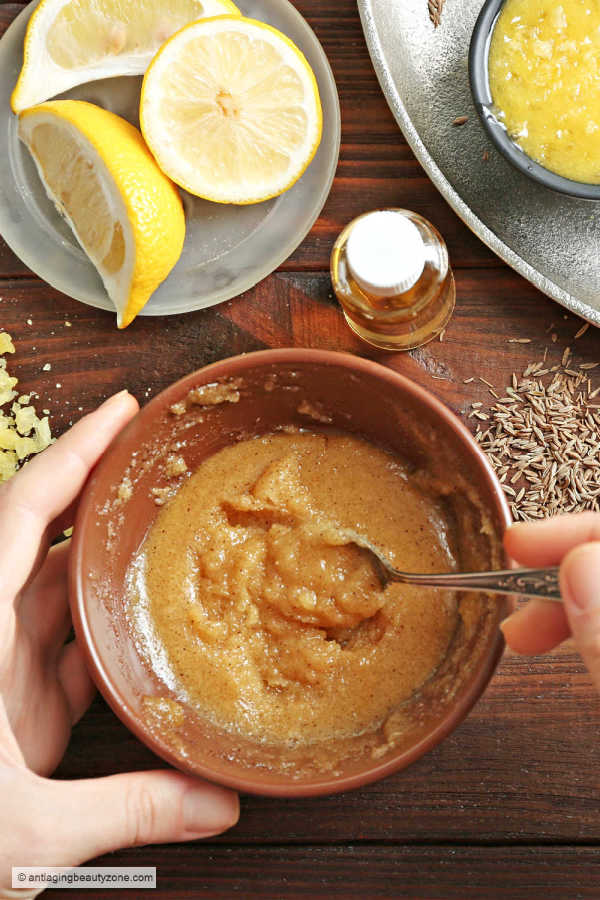
First try, I worried about staining.
Result: smoother, brighter-looking skin after one use. Just make sure to use an old/dark washcloth and rinse surfaces right away.
What type of turmeric to use?
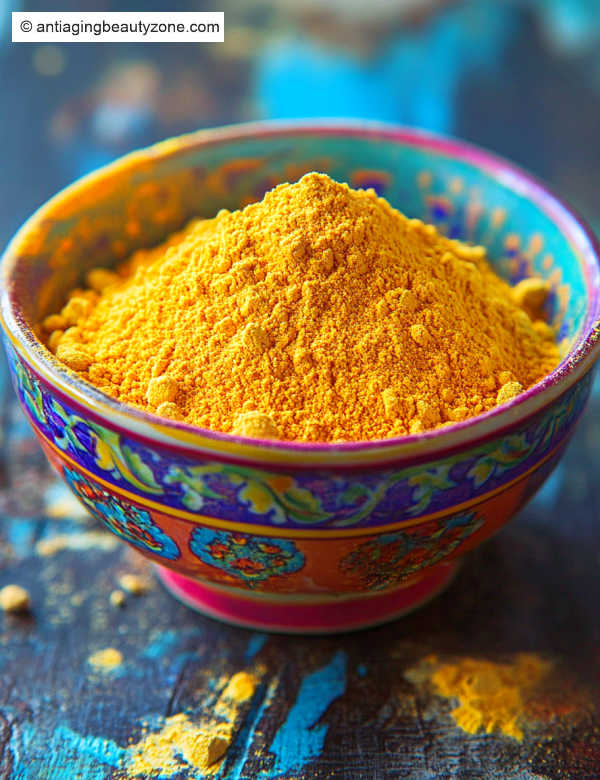
When choosing turmeric look for:
- Choose pure, additive-free turmeric powder.
- “Wild turmeric / kasturi” tends to stain less and is common in beauty use.
- Avoid anti-caking agents and fillers. If sensitive, look for cosmetic-grade, finely ground powders.
Tip: I found that McCormick Ground Turmeric is 100% and does not contain additives. Another great option is to use wild turmeric (also known as Kasturi turmeric), which is less likely to cause yellow stains on the skin and is commonly used in beauty treatments.
Some brands sneak in anti-caking agents or other additives to keep their turmeric fresh and free-flowing. So, always check the ingredient!
Turmeric soaps and face washes for dark spots and dull skin
Turmeric soaps & face washes (quick note)
Prefer a ready-made option? Turmeric soaps/cleansers can support a brighter-looking tone with daily use.
Note: Some great options to check out include:
- VALITIC Turmeric Soap Bar infused with Vitamin C, Retinol, Collagen.
- Glo Melanin Organic Turmeric Soap Bar.
These products are formulated to enhance your complexion and are perfect for daily use.
Best turmeric face washes for discoloration
If you're looking for something gentle for dry skin that effectively removes makeup and is suitable for everyday use, consider a turmeric face wash designed to address dark spots.
This turmeric face wash combines turmeric with other beneficial ingredients, such as glycolic & lactic acids or vitamin C, to target pigmentation issues while gently exfoliating the skin.
Does turmeric really help skin? (quick look)
Turmeric has been used in skincare for centuries, and modern research is beginning to back up its benefits.
- Curcumin shows antioxidant and soothing activity.
- Small studies suggest help with the appearance of uneven tone and redness.
- Results vary; patch test and wear sunscreen.
Some studies suggest that curcumin could slow down melanin-producing proteins, making it a potential natural remedy for brown spots and hyperpigmentation.
However, researchers noted that more studies are needed to confirm its long-term effects on conditions such as melasma and melanoma.
Side effects of turmeric face scrub
Side effects may include:
- Irritation if you scrub too hard or too often
- Temporary yellow staining on fabrics/surfaces
- SPF is a must (any exfoliation increases sun sensitivity)
Note: Always do a patch test,
Final thoughts:
A turmeric face scrub is a quick, gentle way to smooth texture and boost glow. Start 1–2×/week, keep pressure light, and finish with moisturizer + SPF.
If skin is reactive, use the yogurt mask or sugar scrub instead.
Curious how glycolic acid compares to lactic acid?
This quick side-by-side guide explains how each one works, and which may be better for your skin type or exfoliation goals.
FAQs
Question: What is a turmeric face scrub?
Question: What is a turmeric face scrub?
Answer: A gentle DIY exfoliator made with turmeric, a fine sugar, and a skin-friendly oil. It smooths texture and boosts glow without harsh rubbing.
Question: How to make turmeric face scrub?
Question: How to make turmeric face scrub?
Answer: Stir turmeric + sugar → add oil until it looks like wet sand → jar it and cap.
Question: How often should I use it?
Question: How often should I use it?
Answer: Start 1–2×/week. If your skin is reactive, use the yogurt mask instead of scrubbing.
Question: Will turmeric stain my face or towels?
Question: Will turmeric stain my face or towels?
Answer: Skin usually won’t stay yellow, but fabrics/sinks can stain. Use a dark washcloth and rinse surfaces right away. “Wild turmeric/kasturi” tends to stain less.
Question: Are the benefits of turmeric on skin backed by research?
Question: Are the benefits of turmeric on skin backed by research?
Answer: Early/small studies suggest turmeric (curcumin) has antioxidant and soothing effects that can improve the appearance of uneven tone/redness. Results vary—patch test and wear sunscreen.
Question: Can turmeric scrubs fade dark spots or acne scars?
Question: Can turmeric scrubs fade dark spots or acne scars?
Answer: They can brighten the look of uneven tone with consistent use, but they’re not medical treatments. Daily SPF matters.
Question: Is turmeric safe for sensitive or rosacea-prone skin?
Question: Is turmeric safe for sensitive or rosacea-prone skin?
Answer: Often, yes—as a mask (no scrubbing). Patch test, avoid essential oils, and don’t rub during flares.
Question: Can I add lemon juice?
Question: Can I add lemon juice?
Answer: If you do, use only a few drops, patch test, and apply at night (can increase photosensitivity). Skip if you’re sensitive.
Question: Which turmeric is best?
Question: Which turmeric is best?
Answer: Choose pure, additive-free powder. Cosmetic-grade or “wild/kasturi” turmeric is often finer and may stain less.
Question: What’s the difference between turmeric scrubs and masks?
Question: What’s the difference between turmeric scrubs and masks?
Answer: Scrubs = gentle physical exfoliation; masks = soothing benefits without rubbing.
Want More?
I share quick routines, beauty tweaks, and what’s working for me — straight to your inbox. Join the Club and get this free Cheek Shaper Video.
About the Author:
Linda Robison is a Facial Fitness Specialist and the founder of Anti-Aging Beauty Zone. With decades of hands-on experience, she shares practical, natural ways to lift and brighten mature skin—without expensive or invasive treatments.
Before you go ....
Please tap on the💙in the bottom right corner if you found this page helpful.
FOLLOW ME FOR MORE TIPS:
SHARE OR SAVE FOR LATER:




